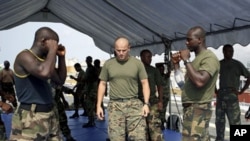While piracy attacks off the coast of unstable Somalia have garnered lots of attention in recent years, maritime security experts say it is on Africa’s western coast, in the oil-rich Gulf of Guinea, where piracy attacks are currently on the rise.
Militants hidden behind bandanas from Nigeria’s Niger Delta oil region fire machine guns into the water from a speeding boat during a recent show of force staged for media.
Their usual attacks range from stealing oil to kidnapping offshore oil workers for ransom.
Maritime security experts say these militants, who have been active for years have now inspired other pirates to arm themselves and stage lucrative attacks, up and down the coast of West Africa, off of Cameroon and more recently Equatorial Guinea, Togo and new oil producer Ghana.
Off the coast of another targeted country Benin, more than 20 pirate attacks were reported this year, after none in 2010.
Experts say it is very difficult to come up with overall statistics, but that it is clear attacks are extending further along the coast and becoming more and more frequent.
Daniel Whiteneck, from the U.S.-based Center for Naval Analyses, says it is no surprise as pirate enterprises are easy to start and sustain in the Gulf of Guinea.
“It is pretty cheap to step out there and say I can engage in quote unquote robbery at sea, smash and grab operations. It does not take a lot of capital investment to become a pirate, and a successful one," he said.
Weak local security and a coastline with many easy hideouts contribute to the problem.
Security experts say, while a few years ago, pirate attacks in West Africa usually consisted of five or six pirates on one speedboat these now usually involve up to 20 pirates on five or six boats
Stan Ayscue, from the Securewest International company, which provides maritime security solutions, says the degree of violence has also gone up in recent years. "We are looking at militants spraying the wheelhouse (where the boat’s steering wheel is situated) with machine gun fire before even getting on board. You are looking at once they are on board, beating crews with riffle butts, people getting whipped with electrical cables and shot quite openly," he said.
Ayscue says pirates in several countries have infiltrated customs offices, so that they know when a ship they want to attack is coming through.
Pirates in the Gulf of Guinea often target ships for cash, valuables and cargo.
But experts say oil interests remain the most lucrative targets for West African pirates. With more and more oil being found further offshore and deeper into the ocean, oil installations are becoming more vulnerable to attack, according to the US Africa Command chief of air and maritime security, Phillip Heyl. "Just taking one crew member off of ship while it is in production could have very negative consequences," he said.
Heyl says AFRICOM has started helping Ghana’s government with maritime security plans to respond to such attacks, which can also make worldwide prices of oil suddenly go up.
Maritime security experts recommend better intelligence sharing, building up national and regional naval forces, and creating better legal frameworks to deal with pirates when they are caught.
They also say that like with most criminal activity, some of the root causes are poverty, corruption and bad governance.
The West African grouping ECOWAS has promised to put the piracy threat on the agenda of its next heads of state summit in 2012.




